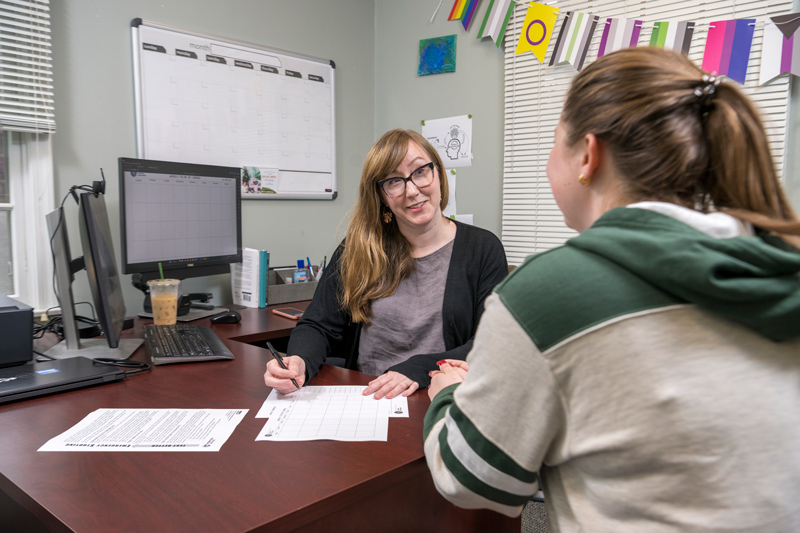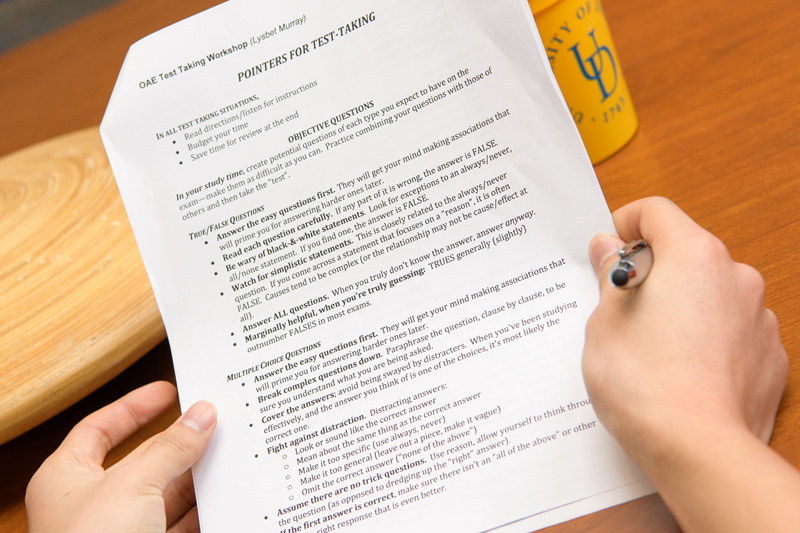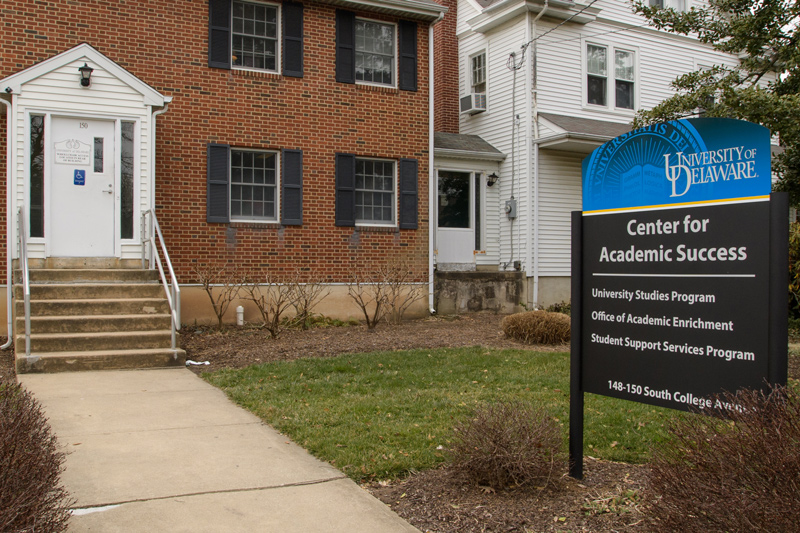


Study tips for finals
Photo by Kathy F. Atkinson May 04, 2023
UD’s Office of Academic Enrichment shares tips on preparing for exams
Final exams — which begin at the University of Delaware on Thursday, May 18 — can be one of the most challenging weeks of the semester.
At UD, the Office of Academic Enrichment (OAE) helps students develop academic skills and strategies so they can be successful. Among the offerings are individual and drop-in tutoring, skill-building classes, one-on-one coaching, review sessions and workshops — and nearly all of the services are free.
Emily Thayer, one of OAE’s academic success coaches, shared effective study strategies so students can ace their exams, manage stress and finish the semester strong.
Two weeks before finals
It’s never too early to begin studying, but two weeks before exams is a great time to start reviewing materials, Thayer said.
“The first thing students need to understand is how learning actually happens, because that is going to guide what they do as they prepare for finals,” Thayer said. “In order for information to get into the long term memory, you have to process it multiple times, in multiple ways.”
Thayer recommends that students begin by reformatting the notes that they’ve taken in class and rewriting them in a way that is easier to understand. Just the process of rewriting notes is helping a student learn, Thayer said, but it also creates study materials that students can look over as the test gets closer.
“A lot of times when you're taking notes in class, you're just trying to hang on for dear life and get information down,” she said. “But after you understand the information a little bit better, you can reorganize it in a way that's more visually helpful for learning.”
In the two weeks ahead of finals, students also need to begin practicing retrieving information from their long-term memory. In other words, they need to test themselves.
When it comes to memorization, flashcards are the gold standard, Thayer said. But students shouldn’t be tempted to use an online quiz generator or use flashcards created by someone else. A big part of the learning process happens by creating those study materials.
“Studies have shown that when you write things by hand, your long term retention of that information is better,” Thayer said. In one of those studies, Thayer said, one group of students took notes by hand and another took notes on a computer. Immediately after taking notes, the students in each group performed about equally. But a week later, the students who wrote by hand had better test scores than the students who took notes on a computer.
For exams where a student needs to apply information or evaluate information, a good practice is to explain or teach the concepts out loud — either to themselves, a roommate or even a pet.
“Explaining it out loud is a good way to check and see if you understand the information,” Thayer said.
Making a schedule for the next two weeks is also critical, Thayer said. Students should make a plan for when they’re going to study, how they’re going to study and where.
“The more organized students are about their studying for the finals, the better the results will be,” Thayer said.

One week before finals
With one week to go until finals, students should be testing themselves more frequently in order to figure out where their gaps in knowledge are. Taking practice quizzes and exams are a great option, Thayer said, but an even more effective way of studying is for students to create practice test questions themselves. Thayer suggests looking through notes and thinking about what the professor emphasized and also looking at what was on previous quizzes and exams.
Explaining answers out loud — especially in simple terms — can also be helpful.
“You might be able to look at your notes and recognize the information, but if you were actually tested on it, you wouldn't know it that deeply,” Thayer said. “The best way to learn something is to teach it. So imagine that you're teaching it to someone else. Can you put the information in simple terms that someone else would understand? If you can't, that's probably an indication that you need to study more.”
Thayer also emphasized that it’s important for students to prioritize their wellbeing.
“Learning just doesn't happen as well when you're stressed, when you're not sleeping well, when you're not eating well — your brain just literally can't process the information and learn it as well,” she said. “So you need to be prioritizing your health, your mental health and your sleep.”
The night before the exam
The night before an exam, students might be tempted to cram, but Thayer advises against pulling an all-nighter.
“They're going to want to stay up all night to make sure that they know the information, but that can actually be counterproductive, because then you are sacrificing your sleep and you're raising your stress levels,” she said.
Instead, Thayer recommends that students skim through their materials or take one last practice test — and prioritize getting a good night’s sleep.
The day of the exam
On the day of the exam, students should make sure they wake up on time and allow enough time so they’re not rushed. Thayer recommends that students get to the exam a little early.
Students should refrain from trying to cram the day of and should instead focus on reducing stress and anxiety. Thayer recommends that students sit and practice deep breathing. Another helpful activity, she said, is writing down your worries before the test.
“Spending five or 10 minutes writing about why they're worried and why they're feeling anxious can free up some of their brain power to focus on the tests,” she said. “It clears out those feelings of anxiety.”

Other tips and resources
If possible, Thayer suggests that students study in groups as part of the variety of ways that they prepare for exams. Particularly if there’s a lot of information to learn, students can divvy up the content and teach each other.
“It forces you to learn that information deeply, but then also hearing another person explaining it in a different way than your professor saying that or a different way than your book explained it is another way that you're taking that information in and processing that information,” Thayer said. “Motivation can also be contagious. If you’re not feeling particularly motivated or focused, working with a group of students who are can help you develop a sense of motivation.”
Thayer also said that short study sessions are better than long cramming sessions. Students also shouldn’t be tempted to wait until one exam is over to begin studying for the next one.
“The brain learns best in shorter amounts of time,” Thayer said. “Long study sessions about the same topic are not effective. If you're spending more than two or three hours on one subject, your brain is like a sponge, and it's full — it can't absorb anymore. Switching frequently between subjects and taking lots of breaks is more effective than long, sustained study sessions.”
Thayer encourages students to meet with an academic coach — not just ahead of finals, but at any point throughout the semester. Academic coaches can help students with academic support, study strategies, motivation and goal-setting, and time management. Students can schedule an academic coaching session online.
“Ideally, we'd like to see students earlier in the semester, so they can start using good learning strategies early on, but it’s never too late to meet with an academic coach,” Thayer said. “We can work together to make a plan and give them specific study strategies for their classes.”
Contact Us
Have a UDaily story idea?
Contact us at ocm@udel.edu
Members of the press
Contact us at 302-831-NEWS or visit the Media Relations website

